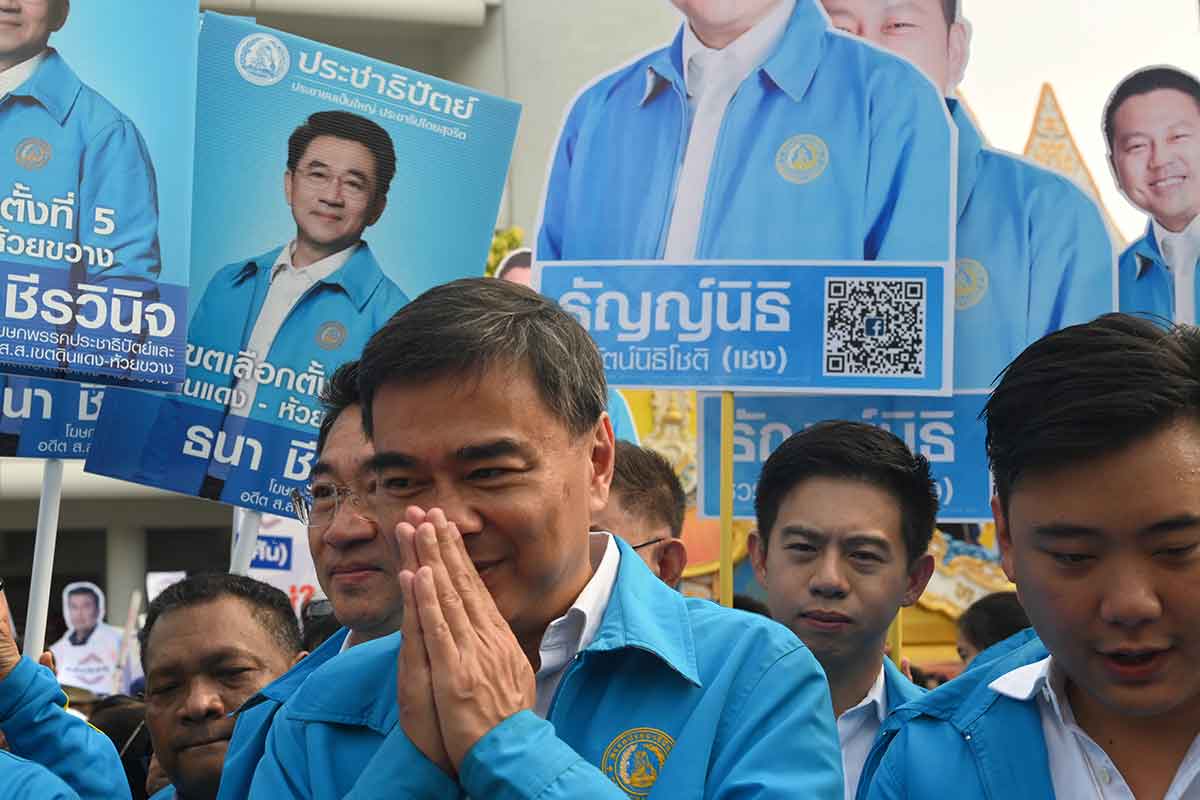It’s now mere weeks away until Thailand’s long-awaited general elections take place on 24 March 2019. The date was set by the Election Commission on 23 January 2019, only hours after a royal decree was issued authorising the poll. Voting will take place under a military-backed charter, ending one of the longest periods of rule by a military junta in Thailand’s modern history.
There has been much buzz leading up to the election around several key political figures, including Prime Minister Prayut Chan-o-cha, the Shinawatras, Future Forward Party leader Thanathorn Juangroongruangkit, and even members of the Thai royal family.
Today, however, The ASEAN Post intends to take a closer look at one figure and party in particular: former Prime Minister Abhisit Vejjajiva and his Democratic Party.
The oldest party in Thailand, the Democratic Party was founded on 6 April 1946 as a conservative and royalist party, and now upholds a conservative-liberal and classically liberal pro-market position.
The Democrat Party made its best showings in parliament in 1948, 1976, and 1996. It has never won an outright parliamentary majority. The party's electoral support bases are in southern Thailand and Bangkok.
In Thailand’s most recent National Institute of Development Administration (NIDA) poll, conducted between 5 to 7 February, 26 percent of the pollsters said that Prime Minister Prayut Chan-o-cha would retain his premiership, while 24 percent polled for Khunying Sudarat Keyuraphan of the Pheu Thai Party. 12 percent said they were uncertain who would be the next prime minister, while Abhisit Vejjajiva received 11.4 percent of the vote. 6.3 percent said they would not vote for anyone.
In terms of popularity, the Pheu Thai Party topped the list with 36.5 percent, followed by the Palang Pracharat Party with 22.6 percent, and the Democrat Party at 15.2 percent.
Source: National Institute of Development Administration
It is clear from the poll that while most of the support seems to be heading towards either Prayut or the Pheu Thai Party, Abhisit and the Democrat Party do hold at least some sway among voters. Meanwhile, political analysts have often been quoted by local media as leaning towards expecting no faction to achieve a majority of legislative seats. This means that parties like the Democrat Party may end up playing kingmaker in the coming election depending on which side they favour.
This leaves the Democrat Party in a powerful albeit complicated position and it seems like it has some choices to make.
On the one hand, it can go for gold hoping that it holds enough sway among supporters in the short span of time before the election to return Abhisit as prime minister. A more likely scenario, however, seems to be for the Democrat Party to choose a side.
Considering the historical fact that both, the military junta and the Democrat Party have had friction with the Shinawatras in the past, it would come as no surprise if the Democrat Party were to choose to form a coalition government led by pro-regime parties. Academics and political scientists believe that this is the route the party will probably chose in the end.
2006 election
In February 2006, then-Prime Minister Thaksin Shinawatra dissolved the House of Representatives and called for new elections in April. In response, Abhisit announced that the Democrats and other opposition parties would boycott the elections. They claimed the elections lacked legitimacy, and was an attempt by Thaksin to divert public attention from his tax-free sales of the Shin Corporation to Temasek Holdings.
Thaksin's Thai Rak Thai Party won an overwhelming majority in the virtually uncontested April 2006 elections. However, the elections also left 38 seats vacant in the House of Representatives, because some Thai Rak Thai Party candidates were unable to garner the constitutionally required minimum of 20 percent of the vote to hold office. In the ensuing political crisis, Thaksin announced he would step down as Prime Minister, and the Constitutional Court ultimately invalidated the election results.
The Thai Rak Thai party charged the Democrats with bribing other small political parties into boycotting the April 2006 elections. An 11-member fact-finding panel voted unanimously in June 2006 to recommend dissolving the Democrat Party, as well as Thai Rak Thai Party and three other parties, based on evidence that the Democrats bribed other opposition parties into boycotting the elections.
In February 2007, candidates from the Progressive Democratic Party testified before the Constitution Tribunal that they were duped into registering for candidacy in the April elections. Three witnesses testified that Democrat leaders Thaworn Senniam, Wirat Kalayasiri, and Jua Ratchasi encouraged protesters to disrupt the registration of candidates during the by-elections after the April 2006 election.
Prosecutors contended that the party tried to disqualify the election results and force continuous rounds of by-elections. The defence claimed that the witnesses were hired by the Thai Rak Thai Party to discredit the Democrats. Ultimately, the Constitutional Court of Thailand acquitted Abhisit and the Democrats of bribery, and instead banned Thaksin's Thai Rak Thai Party for the same charges.
The Democratic Party itself has so far brushed aside any talk of picking a side before the elections. In October last year, Abhisit insisted that his party would not support a dictatorship and said if the party were to form a coalition government, its partners must have shared values. Deputy Democrat leader Nipit Intarasombat explained that Abhisit's stance is that he will not support a dictatorship of any kind, be it a military or parliamentary one – a situation where one political party controls parliament so completely it can do whatever it wants.
The Democratic Party has maintained that it is neither on the junta’s nor the Shinawatra’s side. Perhaps it is adopting a “wait and see” approach. Hence, it is likely that the party’s final stand will only be revealed after the elections are over.
Related articles:
